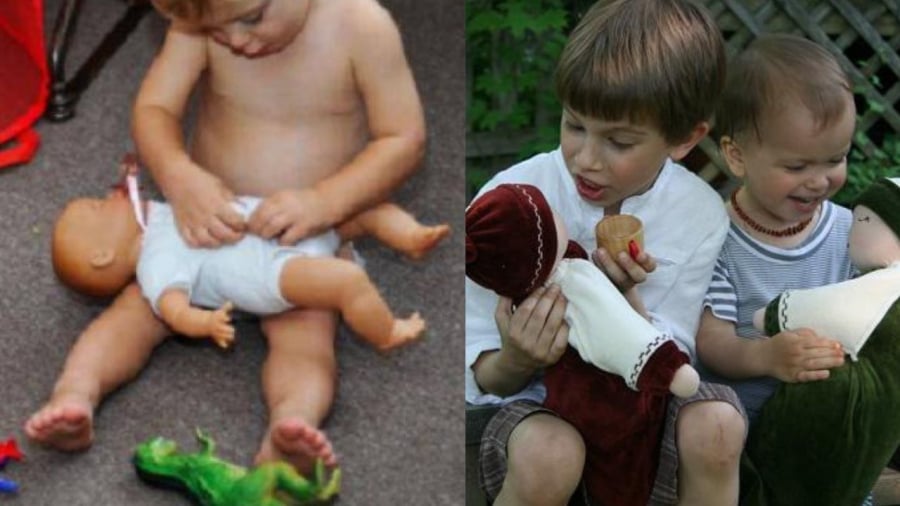Many people scold and persuade their sons when they see them liking feminine things like flowers and dolls, saying that those belong to girls and boys should like cars, guns, tanks… However, psychologists believe that this is an inappropriate action of parents.

Boys playing with dolls is nothing to worry about
According to neuroscientists from Cardiff University (United Kingdom), both boys and girls benefit from playing with dolls in terms of language development and empathy towards others. During the Covid period, experts encouraged children to play with dolls as it limited social interaction. Specifically, children tend to talk more about thoughts and emotions when playing with dolls rather than playing games on a tablet. This research was conducted on 42 children, including 22 girls and 20 boys aged 4 to 8. The study showed that children’s inner world developed better skills when playing with dolls. When playing with dolls, children use language more to express their thoughts and emotions. Especially when playing with dolls alone, children will talk to the dolls.
When playing with dolls, children create an imaginary world and role-play. They communicate in language and absorb messages about the thoughts of others. This helps children in the future, as they will have better emotional and social processing speed.

Dolls become friends for children to recreate what they see in their surroundings, and sometimes practicing with dolls helps children become more confident when communicating with others. Researchers have also found increased brain activity in the parts of the brain related to social and emotional development in children who play with dolls. This happens when children play with dolls in groups or alone, regardless of gender. This means that whether boys or girls play with dolls, they both benefit from it.
Playing with dolls helps children empathize
The research team monitored brain activity when children played with dolls versus playing on a computer, both alone and in groups. The study showed increased brain activity in the postcentral superior temporal sulcus (pSTS), which is involved in the development of emotional and social processing skills in children when they spoke as if their dolls had thoughts and emotions. This helps children empathize with the world and interact socially more easily. Such children are more likely to succeed in life. In 2020, a study in the UK conducted a global survey showing that 91% of parents see empathy as an important social skill they want their children to develop, but only 26% knew that playing with dolls can help their children develop this skill. This means that we are unaware that playing with dolls brings benefits to both boys and girls.
When playing with dolls, children also acquire skills as they dress the dolls, bathe them, and feed them. This enhances observation skills and overall competence for children. What is more interesting is that boys playing with dolls tend to help boys develop skills in dressing themselves and other motor skills.
Is playing with dolls a manifestation of gender imbalance? There is no definite statement that boys liking dolls tend to have a feminine gender. Gender is determined by biological factors rather than psychology. Playing with dolls is simply a preference.
Girl Faces Criticism After Admitting Santa Claus Isn’t Real
Meet Charlie Hayes, a 22-year-old British girl who is making headlines for her bold confession to her child: Santa Claus isn’t real. Charlie’s honesty has sparked controversy, with many parents criticizing her for taking away the magic of Christmas. Despite the backlash, Charlie stands by her decision to tell her child the truth and believes that it’s important to be truthful with children, even if it means bursting their bubble of Santa Claus. Join us as we dive into the debate and explore the different perspectives on Santa Claus and the impact it has on children’s beliefs. Get ready for a thought-provoking discussion that challenges the traditional notions of Christmas and the role of Santa Claus in our lives.














